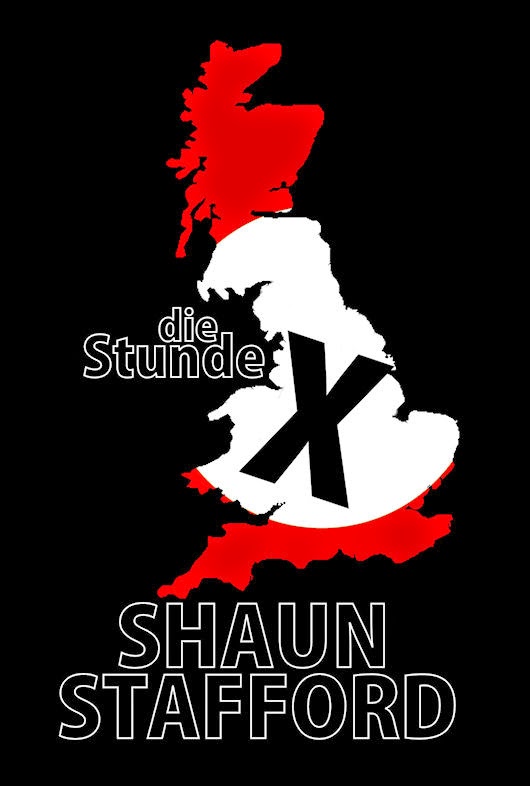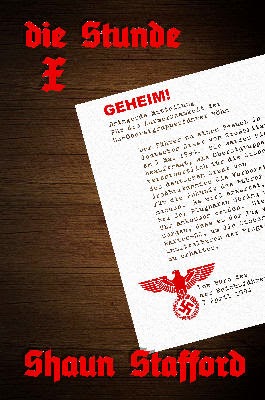Shaun Stafford's Alternative History
Sunday, 12 April 2015
Jetzt schlägt's aber 13
"Jetzt schlagt's aber 13" will be the final book in the trilogy set during the existence of the Greater German Reich. At the moment, other than the title and the cover, and some rudimentary ideas jotted down in a notepad, little exists to tell you, the reader, what will feature. I'm certain that some of the more favourite characters may return, but it also seems more fitting to have this book based on a more global backdrop. Hopefully, there won't be a twenty year delay in getting this one out there - not like the delay between "die Stunde X" and "nach Schema F". I reckon this one will be published towards the end of 2015/beginning of 2016, and should serve as a fitting conclusion to the series.
nach Schema F
Nb - contains plot spoiler
"It is 1997 in the German State of Great Britain.
Ellen Brauchitsch is a young Gestapo officer. She has been tasked with investigating the British governor. What she finds out about him, about the people she works for, will leave her questioning her loyalty to the Greater German Reich.
Marcus Dauny is a computer programmer and a loyal Nazi Party member. He wasn’t expecting that his skills would prove valuable to the English resistance, much less that he would agree to help them. But when he learns what their mission objectives are, he has to decide whether his conscience will allow him to continue.
As the English resistance proceed with their mission, SS-Sturmbannführer Wolf Loritz of the Geheime Staatspolizei, a man who failed in his attempts to prevent the assassination of the Führer in 1995, is desperate to discover what they are up.
The three of them do not realize that they alone are the people who can prevent the world from being plunged into a third world war."
Amazon Kindle version
It took more than twenty years for me to write the sequel to "die Stunde X". In a way, as a dystopian thriller, with its downbeat ending, "die Stunde X" didn't really require a follow-up. But I began to grow more intrigued, more desperate to find out what happened to all of those who survived. The majority of the characters brought back for this second book - Klarsfeld, Ellen, Wolf Loritz - were all German. Over the last twenty years or so, I'd learnt a lot more about characterization, and so I'd endeavoured to bring these characters, and some of the new ones, to life. "Nach Schema F" is a thriller, though probably not as episodic as the first book. I wanted the reader to care about the characters, to feel excited. Though it is set only a couple of years after the first book, and features one of the younger characters from "die Stunde X" - Ellen Brauchitsch - it is less of a Young Adult novel, and more grown-up. Perhaps halfway through writing this novel, I decided that rather than just write a sequel, I should consider a trilogy. But that doesn't mean that "nach Schema F" ends in the middle of the plot. It stands as a novel in its own right, and as a good middle book in the trilogy.
die Stunde X
"It is 1994, London, in the German State of Great Britain.
Jerome Varley witnesses his father arrested by the Geheime Staatspolizei, otherwise known as the Gestapo. Powerless to do anything to save his father's life, he becomes sucked into the world of freedom fighters, battling against the brutal Nazi regime.
Meanwhile, the Russo-American Pact are working with the freedom fighters. They have received word that the Führer is due to visit the German State of Great Britain. The freedom fighters decide to despatch their best assassin to kill him.
But none of them are aware that they have become unwitting pawns in a secret Nazi plot to seize power. As zero hour – die stunde X – approaches, the future of the German Reich, of the entire world, hangs in the balance."
Amazon Kindle version
I wrote "die Stunde X" when I was in my twenties. The lead character, Jerome, is also in his twenties. I suppose, looking back at it now, it's a piece of Young Adult fiction, the tale of a young man trying to find a path to the future, surrounded by older people. The book introduced his girlfriend, a German, Ellen Brauchitsch, and one of the subplots dealt with their complex relationship. I originally called the novel "Heil Fuhrer", after the salutation Nazis used within the book, but when I rediscovered the manuscript (rejected by publishers back in the 1990s) in 2007, it seemed better to change the title. Die Stunde X equates to "zero hour". Given the pace of the book, and the main plot, it seemed a more appropriate title. I have to confess that this book was barely re-edited when I read it again in 2007, and I'm loath to re-read it again, because it's sure to be full of quaint juvenile passages and unspeakable errors. I was still trying to find a voice and style at that age. But as a first foray into the genre, it was an admirable effort. The cover above is the latest one, and is in keeping with a formulaic style for the trilogy of books. The two covers below are earlier ones - you can no longer get them in print form. The one below on the right was banned by Amazon because it displayed a tiny swastika.
Alternative History
Many years ago, when I was just 25, I wrote a book called "die Stunde X". Back then, in 1994, the alternative history scene was small. Publishers told me the book was good, but that stories about the Nazis winning World War 2 had been done before, and so my work wasn't original. Now, twenty years later, alternative history is a growing genre, full of books written not only by mainstream writers but by hundreds of Indie writers. The fan-base is huge. Alternative history offers us - usually - nightmarish visions of what would've happened if events in events had taken a different turn. The two books I have written so far in this genre - "die Stunde X" and its follow-up, "nach Schema F" - are set in a Britain dominated by the Germans, a dystopian vision not of the future, but of the present, had the Nazis won the war.
You need only enter alternative history into Amazon's search box and you will be presented with hundreds of novels on the subject. Most of them seem to cover the Nazi regime. Others describe an America where the Confederates won the civil war. Some are more fantastical - Turtledove's tales of an alien invasion during World War 2 - but nonetheless still enjoyable. Enjoying alternative history novels requires us to suspend our disbelief for the duration of the book and enjoy a fantasy world, to imagine an England where swastikas hang from public buildings and English men and women fear the Gestapo. Some have described it as a geeky genre, and perhaps that is true, but alternative history novels are generally thrillers set against the backdrop of an imperfect present, one where Nazis rule over us, or Americans still hold slaves, or aliens fight alongside the Japanese.
If you can, momentarily, and for the enjoyment of a good thriller, suspend your disbelief, then grab yourself an alternative history novel from the thousands that are out there. They are no less believable than tales of wizards and sorcerers, or lightsabre-wielding Jedis.
You need only enter alternative history into Amazon's search box and you will be presented with hundreds of novels on the subject. Most of them seem to cover the Nazi regime. Others describe an America where the Confederates won the civil war. Some are more fantastical - Turtledove's tales of an alien invasion during World War 2 - but nonetheless still enjoyable. Enjoying alternative history novels requires us to suspend our disbelief for the duration of the book and enjoy a fantasy world, to imagine an England where swastikas hang from public buildings and English men and women fear the Gestapo. Some have described it as a geeky genre, and perhaps that is true, but alternative history novels are generally thrillers set against the backdrop of an imperfect present, one where Nazis rule over us, or Americans still hold slaves, or aliens fight alongside the Japanese.
If you can, momentarily, and for the enjoyment of a good thriller, suspend your disbelief, then grab yourself an alternative history novel from the thousands that are out there. They are no less believable than tales of wizards and sorcerers, or lightsabre-wielding Jedis.
Subscribe to:
Comments (Atom)




